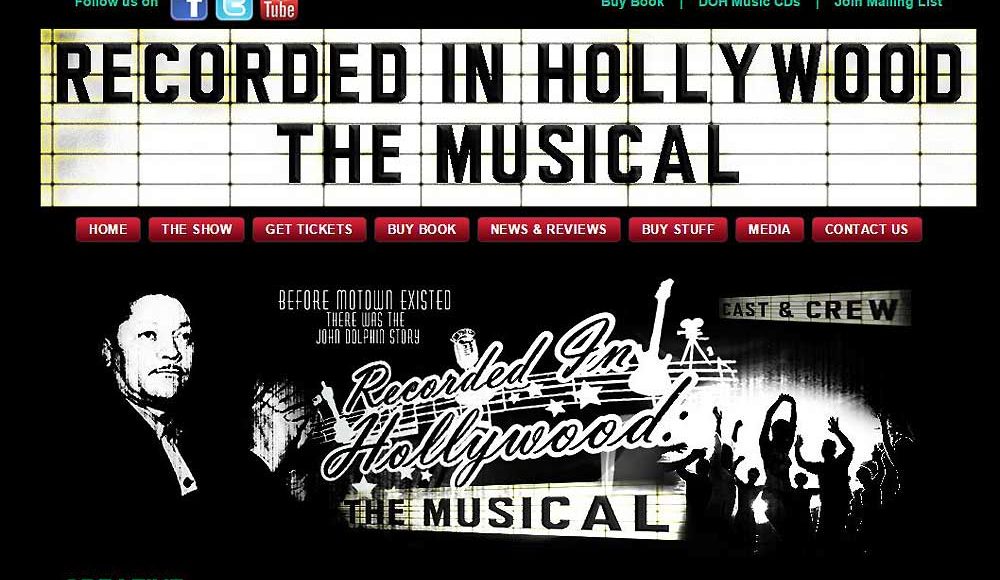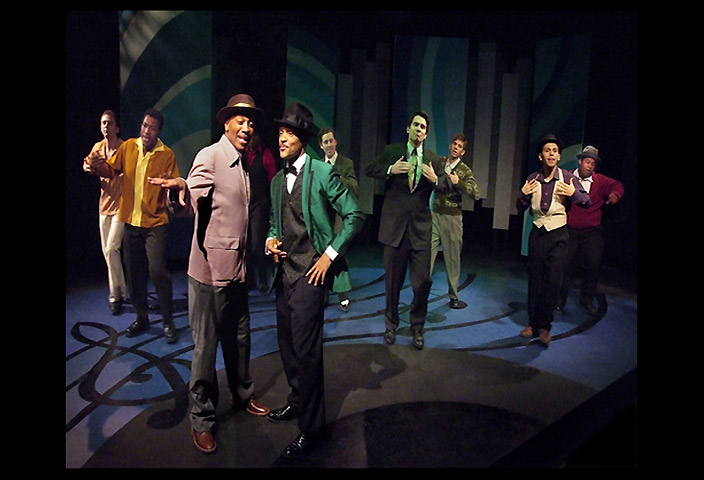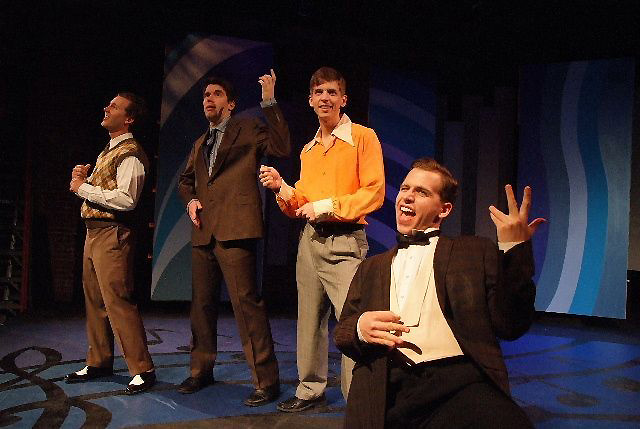Okay, a quick side bar.
My mother came to Los Angeles in the early ’50s as a single parent. She was a raven haired beauty, and my mom, how to phrase this…?
My mom gave me many uncles. Many uncles.
Frankly, my mom liked men and men liked her.
Now in our years together I only heard her bad mouth two men. Bugsy Siegel and Chief William Parker of the Los Angeles Policie Department, and she had kinder words for Siegel.
So I was somewhat blinded sided going into Recorded in Hollywood: the Musical, the new production at the Lillian Theatre.
You see, after men, my mother’s greatest passion was music, and she affirmed, with regularity, that the greatest record store ever in all of history was Dolphin’s of Hollywood; this before segueing into a diatribe against Chief Parker who tried his upmost to shut it down through police intimidation and a media campaign against the dangers of racial intermingling.
Dolphin’s of Hollywood opened on Central Avenue in Los Angeles in 1948 at a time when L.A. was considered a hub for jazz and Central Avenue a stout spoke.
Opened twenty-fours, offering “two for one” sales, and lining its store walls with R&B labels impossible to buy anywhere else in the city, helped make the store a success. But it was the radio broadcasts on KRKD from the store’s window that put Dolphin’s of Hollywood on the national map and earned its proprietor, John Dolphin, aka “Lovin’ John,” his niche in both music history and the history of L.A.
Dolphin had originally wanted to open his shop in Hollywood itself, but the refusal of white landlords to rent to a black businessman prevented this.
Barred from Hollywood, Dolphin decided he’d bring “Hollywood to Central.”
And bring it he did.
With D.J.s like Hunter Hancock and Dick “Huggie Boy” Hugg spinning the plates, Dolphin’s of Hollywood would attract such musicals icons as Billie Holiday, Duke Ellington, B.B. King, Charlie Parker, Aretha Franklin, Nat King Cole.
It also attracted the attention of Chief William Henry Parker III (June 21, 1905 – July 16, 1966), Los Angeles’ longest-serving police chief, whose name, was sadly, affixed to the LAPD’s headquarters until 2013.
Any familiarity with Parker’s views on the subject, which are available on old radio and television recordings, can only lead to the conclusion, here was one racist son of a b–.
Parker’s problem with Dolphin’s Of Hollywood was not its broadcasting of that “jungle music,” (one of the more unobjectionable labels applied to doo-wap, R&B and other musical styles by the more conservative and intolerant.)
No, what Parker objected to, and viewed with unabashed disgust, was the mingling of the races.
Young black, Latino and white music lovers would be drawn together at Dolphins’, and that was too much for Parker.
A police corridor was thrown around Dolphin’s Of Hollywood, not only would black and Latino patrons face harassment, but any vehicle with a white behind the wheel was pulled over and the driver warned of the dangers they courted by being in the area.‡
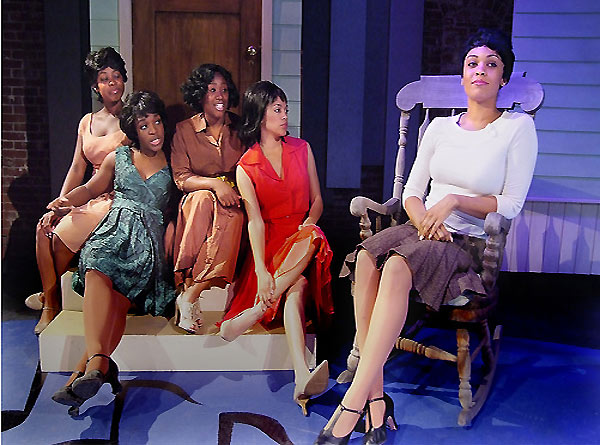
Brooke Brewster, Katherine Washington, Sha’Leah Nikole Subblefield, Jenna Gillespie, Jade Johnson (Photo by Ed Krieger)
John Dolphin’s finest moment came in his battling the racism of Parker and others like him.
Recorded in Hollywood: the Musical is John Dolphin’s story; with book by Jamelle Dolphin, his grandson, and Matt Donnelly, and Andy Cooper supplying both music and lyrics.
The show, all in all, is pretty terrific.
Cooper fills all the demands made by musical theatre with great flair and a steady sureness of craft. He also succeeds in capturing the changing styles and taste music underwent in the decade that the play covers.
And he is fortunate in having a solidly talented cast capable of embracing and supporting his efforts.
Brooke Brewer, John Devereaux, Richie Ferris, Jenna Gillespie, Franklin Grace, Nic Hodges, Philip Dean Lightstone, Jake Novak (as Elvis no less!), Rahsaan Patterson, James Simenc, Matthew Sims, Jr., Sha’Leah Nikole Stubblefield (What is that, like a gazillion points in Scrabble?) and Katherine Washington all deserved praise for exceptional work. And that’s why they got it.
As John Dolphin, Stu James cannot be faulted, his performance is topnotch and his singing succeeds in being even two or three notches above that. He carries a demanding score and a weighty show with the aplomb of Atlas.
As Ruth, his long suffering and devoted wife, Jade Johnson brings sincerity and a sweetness that sells her relationship with “Lovin’ John” without compromising her character or her performance.
Godfrey Moye is superb as the velvet-voiced Sam Cooke and Nic Olsen as Huggy Boy, whose radio career would continue until his last broadcast with KRTH-FM four years before his death in 2006, comes close to a show stealer.
Eric B. Anthony as Percy Ivy has been given a difficult role; he is the ticking bomb in the drama, and Dolphin and Donnelly seem to demand he be “all things to all people.” That he manages to pull this off as well as he does reflects well on his talents and skills.
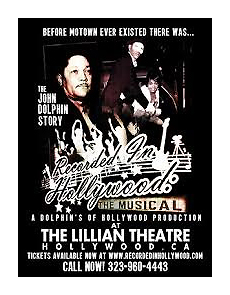 Denise Dowse directs on a set by Joel Daavid.
Denise Dowse directs on a set by Joel Daavid.
Daavid has, on numerous occasions past, contributed just the panache needed by some shows to set them apart from the standard equity waver offering.† Here he has provided Dowse with a set that meets her needs admirably.
It strikes me, and I may be mistaken, that choreographer Cassie Crump was somewhat stymied by the Lillian’s venue which does offer certain challenges to the staging of large dance numbers. Still Crump manages to match the score’s demands with vim and vigor.
Dowse also succeeds in her efforts, and though her direction may not be called a “spectacular success,” success it is none the less.
There are flaws to the show.
First being it is book-lite in a story that needs language – it is about a salesman after all.
Musical theatre needs a good book, as the addition of the spoken word always ups the emotional ante. People cry at West Side Story, which ends in spoken word. They’ll cry at Madame Butterfly too, but it’s the music that triggers the response, not the play, and musical theatre is not opera – thank god!
Dolphin’s conflict with Parker is passed over too quickly, which is a pity. Not just because most LAers suffer from a lack of historical knowledge about their city, but more importantly because it could have been employed to great effect in shaping the redemption of the drama’s lead protagonist as well as in sharpening the tragedy that befell him.
In their story Dolphin and Donnelly have seemingly decided to pitch to the audience underhanded.
It’s a choice, I just don’t know if it’s the right one.
The depiction of Sam Cooke gives no hint of the dark and tangled journey awaiting him, but as he is not the focus of the drama this is acceptable.
However, the portrait of John Dolphin places him slightly under Gandhi. The truth was much murkier, and probably more interesting.
He was in the music industry, for the love of Pete!
To argue there was a saint in the music industry is akin to arguing there’s a virgin lurking in a Vegas cat house. This failing is perhaps forgivable, who doesn’t cherish their grandfather fondly?☺
But whatever flaws a curmudgeon critic may dig up, the fact remains that Recorded in Hollywood: the Musical is a surefire crowd pleaser that tells the tale of a time and a struggle that should never be forgotten; and of a man who not only helped bring the sounds of rhythm & blues to a much wider and, very much, whiter audience, but who added significantly to the greatness of the L.A. that is.
If you’re in need of an opportunity to “hum some tunes” and “tap your toes,” well rejoice, you’ve just been given it on a platter.
A licorice one.
John Dolphin died on February 1, 1958 behind his office desk at 1252 S. Berendo Street.
In Hollywood.
* * *
Recorded in Hollywood: The Musical
NOW PLAYING thru Sunday, May 17
Elephant Stages – The Lillian Theatre
6322 Santa Monica Blvd
(Santa Monica & 1076 Lillian Way)
Los Angeles, CA 90038
Tickets Now Available
(323)960-4443
www.recordedinhollywood.com
FOOTNOTES:
‡ My mother was twice told by officers who pulled her over that she faced gang rape by her presence in the neighborhood. The third time the officer had barely leaned down to the driver side window before she mouthed off, “Yeah, yeah, yeah gang rape. Can I go buy my records now?” He gave her a speeding ticket.
† We’ll make no mention of those scant few productions he’s been involved with that neither an act of congress nor divine intervention could have salvaged.
☺ Mine dropped dead in a porn shop clutching a copy of The Big Ass Mamas of Miami. Ah, Gramps….





